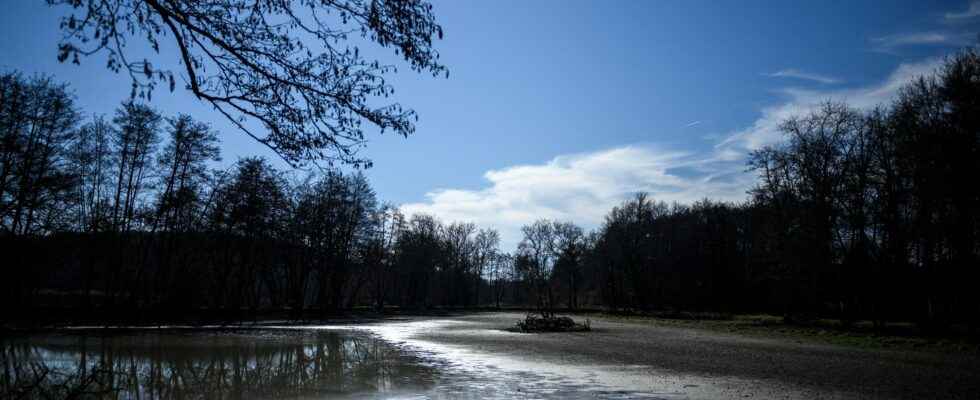France has been dry since January 21. On Friday, the country experienced its 27th day in a row without rain, with the cumulative daily rainfall being less than 1 mm across the metropolis. And the situation should not change in the coming days. After an unprecedented drought in terms of its intensity in 2022, only a very rainy winter could allow groundwater to return to their usual levels.
The latter already showed low levels in January “worrying over a large part of the territory”, according to the BRGM. However, the recharge period from November to March is crucial for the water stocks to be replenished.
The first half of January was rather good with rainfall relatively close to seasonal norms (around 80 mm of rain) according to Météo France. “On the other hand, from February 1 to 16, the cumulative rainfall reached 2.7 mm against 38 mm on average. For a full month of February, the normal is 68 mm, points out to AFP Simon Mittelberger, climatologist to Météo France. Result: “The soils have dried up considerably since the middle of January. The current state corresponds to what is usually observed around mid-April. So we have two months in advance”, he specifies.
“Arid Winter”
This rainfall deficit is linked to the predominance of anticyclonic conditions that affect the entire country. “The anticyclone acts like a shield that protects France from the arrival of disturbances from the Atlantic, explains Simon Mittelberger. It repels depressions, and therefore bad weather, by shifting them mainly towards northern Europe. ” In addition to the lack of rain, there are particularly high temperatures, the consequences of climate change. It has now been twelve months in a row that it has been warmer than normal in France and February is on track to be the thirteenth month of this unprecedented series.
On social networks, many experts have expressed their concern. “Winter drought is becoming worrying”, alert on Twitter Gaétan Heymes, forecasting engineer and snow scientist at Météo France. “It is possible that, on a national scale over the period 1959-2023, this month of February 2023 will become the driest month of February observed in France, and that we will begin the weather spring with the driest soils observed,” he warns.
“If the atmospheric dynamics of the coming weeks do not help, 2023 will be very critical, abounds the climatologist Christophe Cassou, main author of the 6th report of the IPCC, supporting card. The researcher calls for “anticipate” and “play” on the demand and use of water in order to distribute the supply fairly and transparently.
In the East, the situation worsens. “It’s not fiction, it’s not forecasts for this summer, it’s the reality observed in February: catastrophic drought in the Pyrénées-Orientales. Already irreparable consequences on the vegetation”, is alarmed Meteo France meteorologist François Jobard on Twitter. The departments of the Mediterranean arc such as the Pyrénées-Orientales and the majority of the Var are already subject to restrictions on the use of water due to an “arid winter”. “In part of the Occitania region, the soils have never been so dry at this time of year, at levels corresponding to mid-July”, confirms Simon Mittelberger.
Conditions conducive to fires
“The soil humidity index for Perpignan is worthy of a semi-desert climate. In the middle of winter, the index for February is equivalent to that for the month of… August. A record! The vegetation suffers and dies on its feet “, outbids agroclimatologist Serge Zaka on Twitter.
If the soils are very dry for this time of year, they remain much wetter than in summer, the risk of flooding by runoff is therefore much lower. On the other hand, these conditions are conducive to the spread of fires in windy weather. In a press release published on February 6, the firefighters of the Pyrénées-Orientales thus report “identical intervention conditions to the summer season without the support of aerial means and preventive devices” following a fire which caused the destruction of 60 hectares of vegetation in Torreilles, near Perpignan.
The first fires also broke out in Bouches-du-Rhône in early February. If the situation is not unprecedented, “we expect a summer as intense and difficult as that of 2022 since we are unable to compensate for the rain deficits that we are accumulating”, explained Monday on the set of France 3 Colonel Jean-Luc Beccari, director of the Bouches-du-Rhône departmental fire and rescue service.
